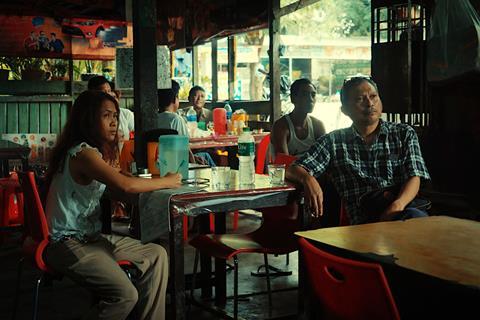Midi Z’s portrait of a Myanmar health clinic widens to explore the plight of a country in turmoil

Dir: Midi Z. Taiwan/Myanmar. 2023. 87mins
Midi Z’s challenging documentary The Clinic starts as an absorbing portrait of two doctors ministering to the people of Yangon in Myanmar. It abruptly broadens in scope to offer a more fractured collage of the country’s trauma and how that is reflected in individual lives. The international reputation of Midi Z (Ice Poison (2014), The Road To Mandalay (2016), Nina Wu (2019) etc) and the possibility of a rare glimpse into life in Myanmar should prompt further festival screenings following a world premiere at IDFA for a film which was also recently nominated for Best Documentary at Taiwan’s Golden Horse Awards.
Invites the viewer to observe, absorb and contemplate the anguish of a country in turmoil
There is something of Frederick Wiseman in the film’s initial stages, with its intense focus on the daily work of doctors Aung Min and San San Oo. What initially appears as a shabby, cluttered corner shop turns out, on closer examination, to be a medical centre. Plastic chairs are arranged in a row like a makeshift waiting room. Shelves groan under the weight of boxes and cartons. Blister packs are strewn over a counter and syringes lie stacked up in plastic bags. A calendar on the wall reveals that it is 2017. Operating at night, the clinic is literally a beacon of light in the dark.
We are able to witness the interactions with patients. One man arrives with an infected leg wound. One woman has head lice acquired during a recent stay in the psych ward of a hospital. They are all treated with kindness as the doctor offers advice and mild chastisement. Almost like a hairdresser, the clinic is a place where confidences are exchanged and confessions made. Mental health and alcohol-related illnesses play a big part in the conversations. There is talk of corruption and incompetence, a reference to far away events in Rakhine State and the Royhinga population.
We come to see that the clinic is almost a community centre. The walls are covered in drawings and paintings. Some patients are invited to return for a meal. Aung Min and San San Oo never seem to close their doors or halt their service. Aung Min is never still, pacing anxiously back and forwards while waiting for the next patient.
Around a third of the way into the film, an opening title appears and the documentary shifts a gear. Midi Z moves away from the clamped, cluttered setting of the clinic, and we see the vast local river and the rain-sodden terrain of the wider world. The fondness for static shots gives way to a more impressionistic approach. We hear the voice of Aung San Suu Kyi talking about the riots in Rakhine State and the plight of the Rohingya, Myanmar’s Muslim minority community. We learn that, as well as being doctors, San San Oo is also an accomplished painter and Aung Min a filmmaker, planning to shoot a feature about a Rakhine actor growing a beard for a role as a Rohingya and behaving increasingly like a Rohingya as the shooting unfolds.
Aung Min’s short, evocative films provide a unifying thread through the last two thirds of the film as we see aspects of Myanmar life from fisherman at work to women bearing offerings of flowers. Even as we witness the making of Aung Min’s film and his attendance at some local film festivals, it is the plight of the Rohingya that becomes the most compelling element of the documentary. Full-screen black and white images by Canadian photojournalist Kevin Frayer powerfully convey the ethnic cleansing visited upon the Rohingya. We can see the fear etched on the faces of those fighting for survival as they have no option but to flee the country.
The Clinic ends in 2021, with Aung Min and San San Soo still providing that light in the dark for a country once again under military rule. It is a film that offers little in the way of explanation or commentary, but invites the viewer to observe, absorb and contemplate the anguish of a country in turmoil. On that level, it proves highly effective.
Production company: Seashore Image Productions, Taiwan Public Television Service, Xi Xi Productions, Myanmar Montage Films
International sales: Seashore Image Productions, Isabella Ho isabellaho@seashore-image.com
Producers: Wang Shin-Hong, Lin Sheng-Wen, Aung Min, San San Oo, Isabella Ho.
Screenplay: Midi Z, Ke-Xi Wu
Cinematography: Peter Pan
Editing: Midi Zi, Ke-Xi Wu
Music: Lim Giong






![The Brightest SunScreen[Courtesy HKIFF]](https://d1nslcd7m2225b.cloudfront.net/Pictures/274x183/3/5/0/1448350_thebrightestsunscreencourtesyhkiff_312678.jpg)















![The Brightest SunScreen[Courtesy HKIFF]](https://d1nslcd7m2225b.cloudfront.net/Pictures/100x67/3/5/0/1448350_thebrightestsunscreencourtesyhkiff_312678.jpg)

